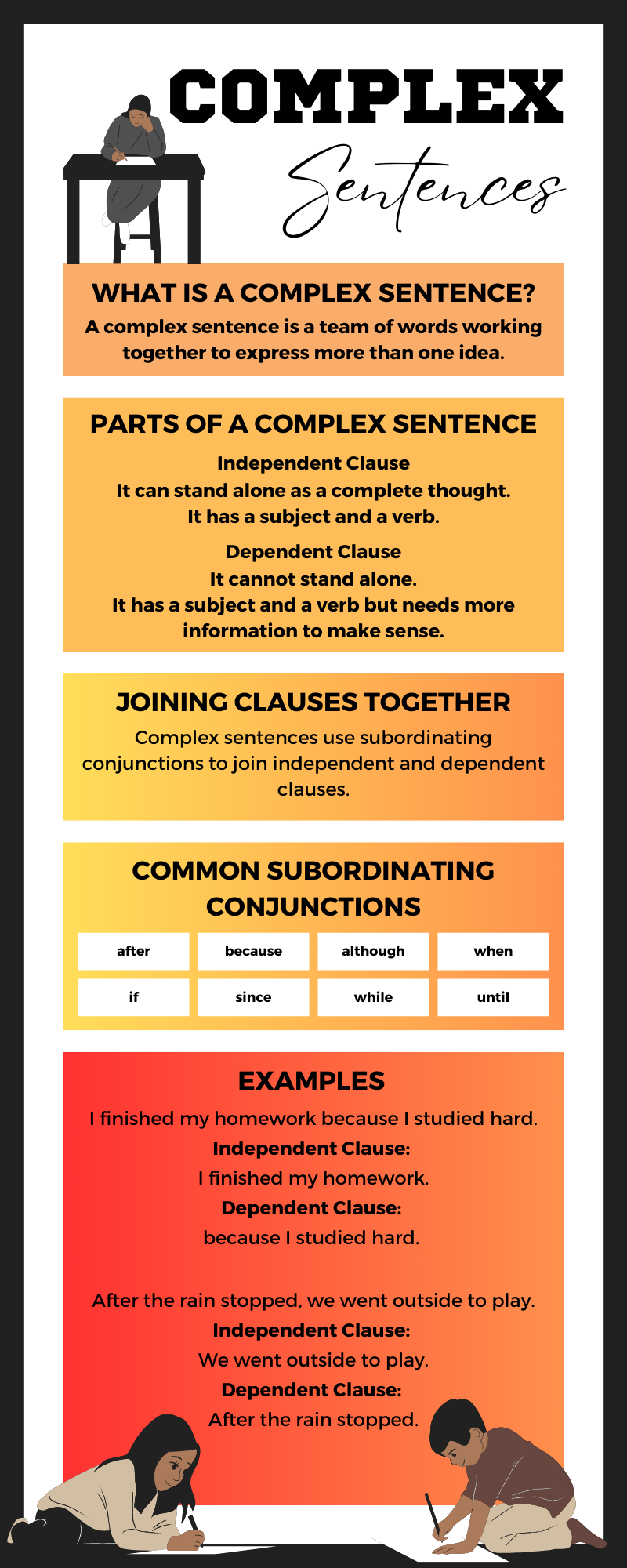




Step-by-Step Guide to Solving Complex Sentences
FAQs on Complex Sentences Made Simple for Students
1. What is a complex sentence in English grammar?
A complex sentence is a type of sentence that contains one independent clause (a complete thought that can stand alone) and at least one dependent clause (an incomplete thought that cannot stand alone). The dependent clause adds extra information, such as context or reason, to the main idea in the independent clause.
2. How is a complex sentence formed?
A complex sentence is formed by joining an independent clause with a dependent clause. This connection is made using either a subordinating conjunction (e.g., because, although, when, if) or a relative pronoun (e.g., who, which, that).
3. What are some common subordinating conjunctions used in complex sentences?
Subordinating conjunctions are essential for creating complex sentences. Some of the most common examples include:
- Time: when, after, before, since, while
- Cause & Effect: because, as, since
- Condition: if, unless
- Contrast: although, though, even though
4. What are some examples of complex sentences?
Certainly. Here are a few examples showing different structures:
- Because it was raining, we decided to stay indoors. (Dependent clause first)
- We will go to the park after we finish our homework. (Independent clause first)
- The student who answered the question correctly received a prize. (Relative clause in the middle)
- Although she was tired, she completed the assignment.
5. What is the primary role of a dependent clause in a complex sentence?
The primary role of a dependent clause is to provide additional information that modifies or adds context to the main idea in the independent clause. It cannot stand alone as a sentence and often explains the 'why', 'how', 'when', or 'where' of the main action, making the sentence more detailed and specific.
6. What are the key punctuation rules for complex sentences?
The main punctuation rule for complex sentences is straightforward: If the dependent clause comes before the independent clause, you must place a comma after it. For example: "When the bell rings, the students leave." However, if the independent clause comes first, you generally do not need a comma before the dependent clause.
7. What is the main difference between a complex sentence and a compound sentence?
The main difference lies in the types of clauses they connect. A compound sentence joins two or more independent clauses (complete thoughts) using a coordinating conjunction like 'and', 'but', or 'so'. In contrast, a complex sentence joins one independent clause with at least one dependent clause (an incomplete thought).
8. Why is using complex sentences important for improving writing skills?
Using complex sentences is crucial for effective writing as it allows you to show clear relationships between ideas. Instead of using a series of short, simple sentences, complex sentences help create a more sophisticated and fluent writing style. They enable you to convey nuanced thoughts and establish cause-and-effect, contrast, or conditional relationships, making your arguments more persuasive and your descriptions more vivid.
9. What is a relative clause, and how does it function as a dependent clause?
A relative clause is a specific type of dependent clause that describes a noun. It often begins with a relative pronoun like who, whom, whose, which, or that. It functions as a dependent clause because it adds extra, descriptive information but cannot stand alone as a complete sentence. For example, in "The book that is on the table is mine," the clause "that is on the table" is a relative clause describing the book.
10. How does a compound-complex sentence differ from a regular complex sentence?
A compound-complex sentence is a more advanced structure. While a complex sentence has one independent clause and at least one dependent clause, a compound-complex sentence contains two or more independent clauses plus at least one dependent clause. For example: "Although I am tired (dependent), I will go to the party (independent), but I will leave early (independent)."
11. Can a complex sentence begin with a dependent clause?
Yes, a complex sentence can absolutely begin with a dependent clause. This is a common and effective way to structure sentences for emphasis or variety. When a sentence starts this way, it must be followed by a comma before the independent clause begins. For example: "After the movie ended, we went for a walk."























